Reflecting on Cultural Competence in Healthcare: HSC230 Essay
VerifiedAdded on 2021/04/24
|6
|1659
|140
Essay
AI Summary
This essay, titled "Cultural Competence in Healthcare," reflects on the importance of cultural competence in healthcare settings. The student explores the concept of cultural competence, defining it as the ability to provide effective healthcare services that meet the social and cultural needs of patients, leading to improved health outcomes and the reduction of health disparities. The essay delves into the student's personal values, beliefs, and behaviors, examining how these attributes either contribute to or detract from their ability to be a culturally safe practitioner. Key values discussed include confidentiality, integrity, empathy, and resilience, with the student analyzing how each impacts their interactions with patients from diverse backgrounds. Beliefs regarding non-discrimination, respect, and appreciation for diversity are also explored. Furthermore, the essay connects these values and beliefs to specific behaviors, such as respecting others, demonstrating empathy, appreciating different cultures, and exhibiting resilience, and assesses how these behaviors influence their cultural competence. The conclusion emphasizes the critical role of cultural competence in healthcare, highlighting how the alignment of healthcare providers' values, beliefs, and behaviors can significantly improve the quality of care and patient outcomes. The essay is supported by references to relevant academic literature.
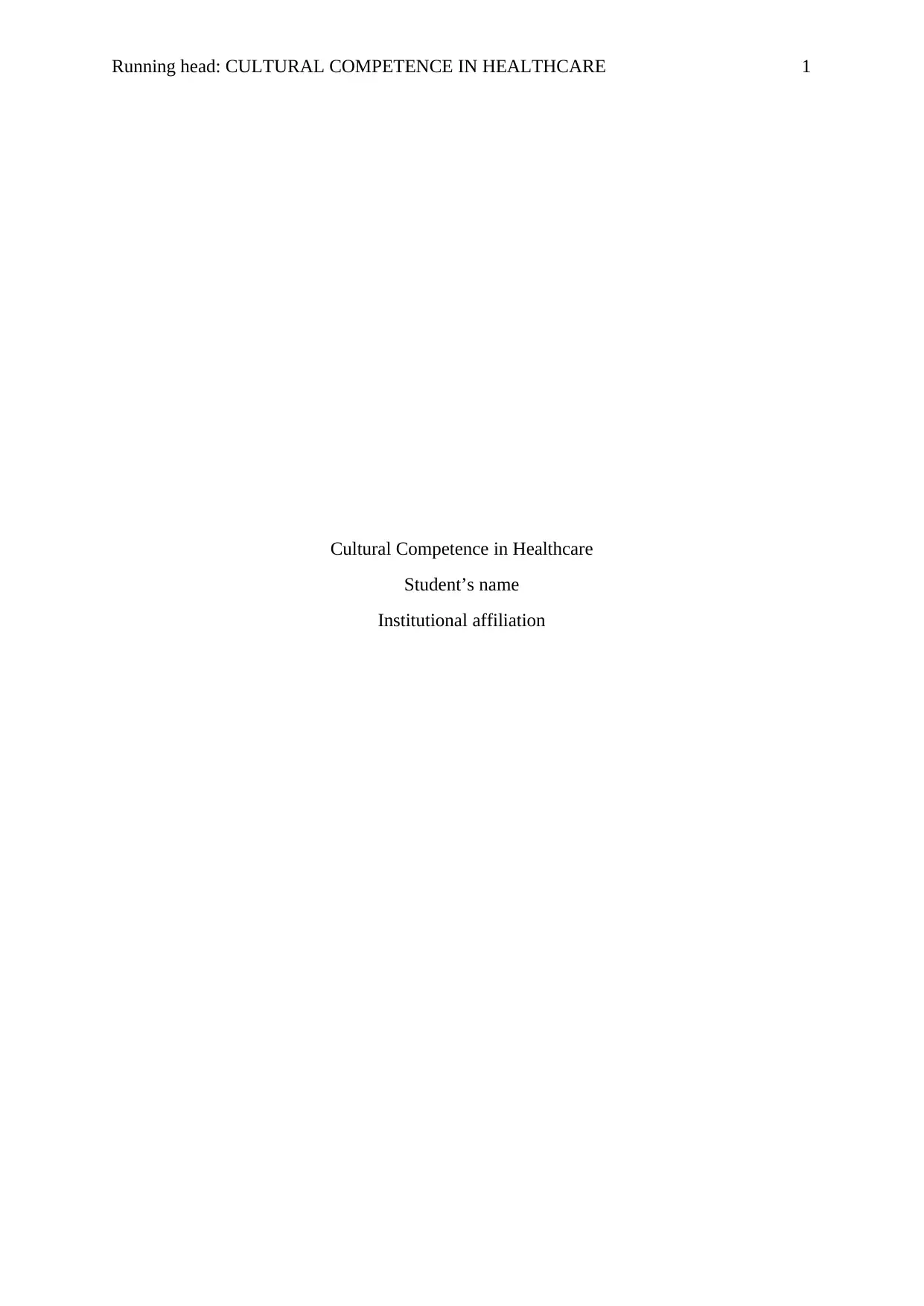
Running head: CULTURAL COMPETENCE IN HEALTHCARE 1
Cultural Competence in Healthcare
Student’s name
Institutional affiliation
Cultural Competence in Healthcare
Student’s name
Institutional affiliation
Paraphrase This Document
Need a fresh take? Get an instant paraphrase of this document with our AI Paraphraser
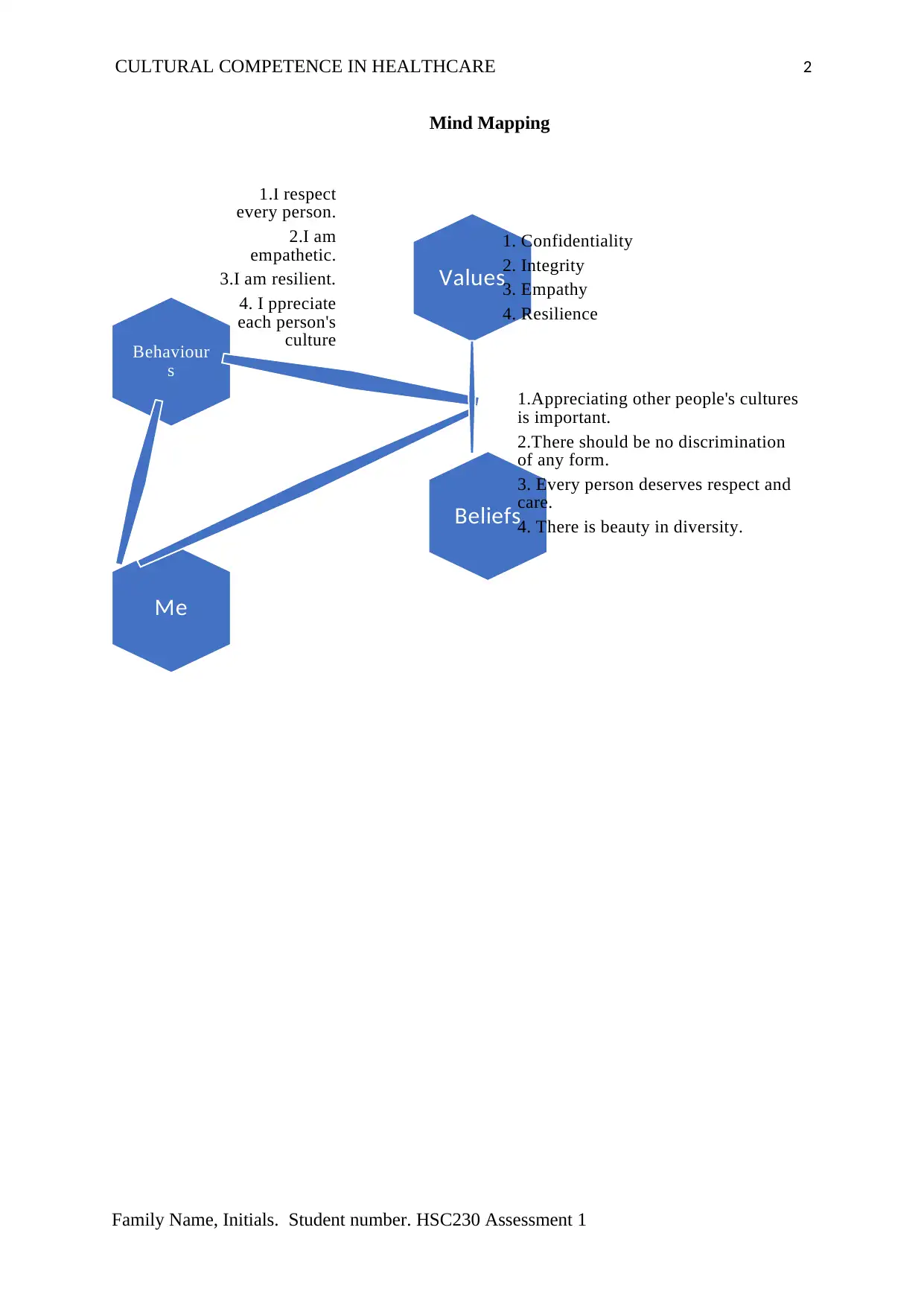
CULTURAL COMPETENCE IN HEALTHCARE 2
Mind Mapping
Family Name, Initials. Student number. HSC230 Assessment 1
Values
1. Confidentiality
2. Integrity
3. Empathy
4. Resilience
Behaviour
s
Me
1.I respect
every person.
2.I am
empathetic.
3.I am resilient.
4. I ppreciate
each person's
culture
Beliefs
1.Appreciating other people's cultures
is important.
2.There should be no discrimination
of any form.
3. Every person deserves respect and
care.
4. There is beauty in diversity.
Mind Mapping
Family Name, Initials. Student number. HSC230 Assessment 1
Values
1. Confidentiality
2. Integrity
3. Empathy
4. Resilience
Behaviour
s
Me
1.I respect
every person.
2.I am
empathetic.
3.I am resilient.
4. I ppreciate
each person's
culture
Beliefs
1.Appreciating other people's cultures
is important.
2.There should be no discrimination
of any form.
3. Every person deserves respect and
care.
4. There is beauty in diversity.
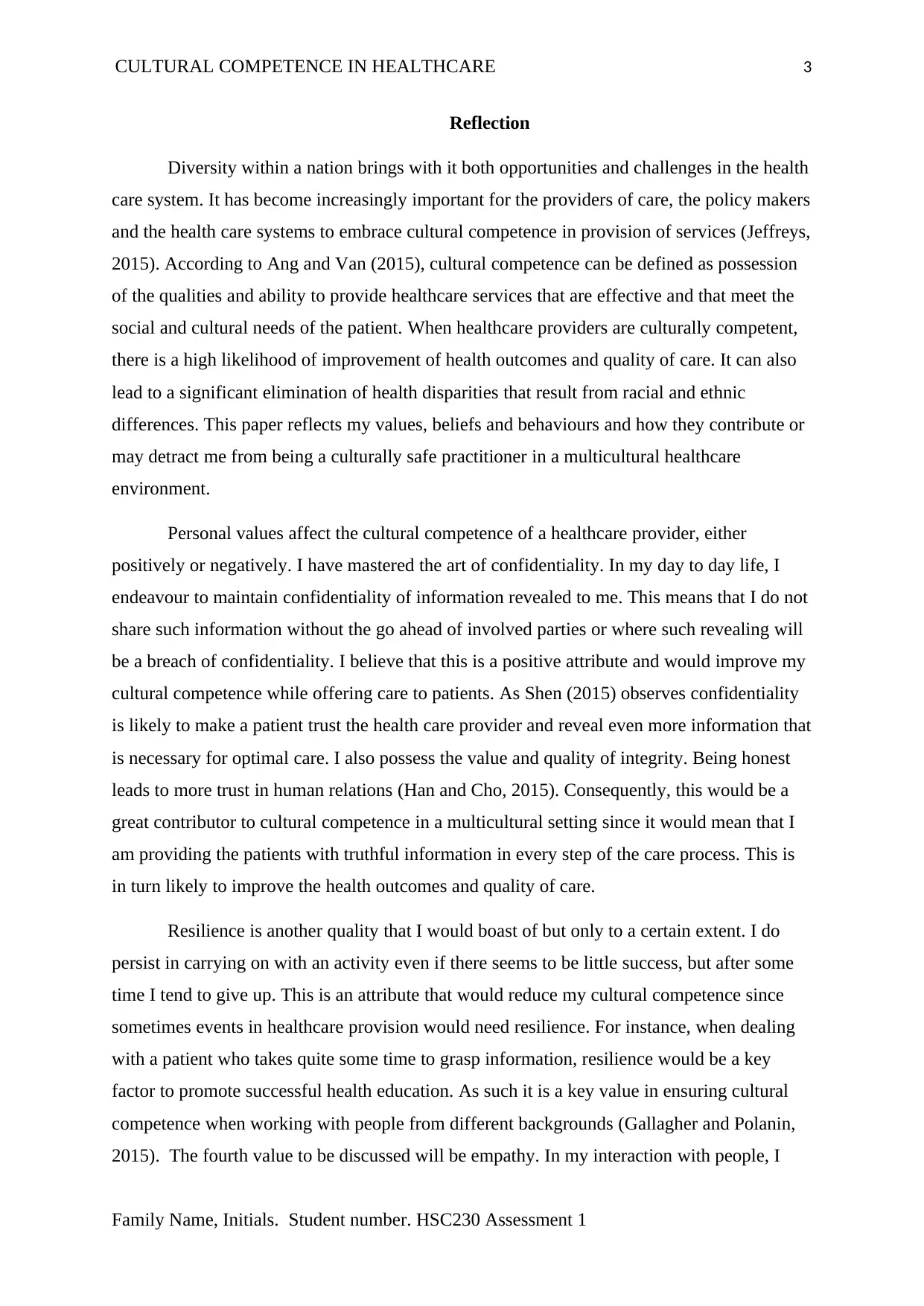
CULTURAL COMPETENCE IN HEALTHCARE 3
Reflection
Diversity within a nation brings with it both opportunities and challenges in the health
care system. It has become increasingly important for the providers of care, the policy makers
and the health care systems to embrace cultural competence in provision of services (Jeffreys,
2015). According to Ang and Van (2015), cultural competence can be defined as possession
of the qualities and ability to provide healthcare services that are effective and that meet the
social and cultural needs of the patient. When healthcare providers are culturally competent,
there is a high likelihood of improvement of health outcomes and quality of care. It can also
lead to a significant elimination of health disparities that result from racial and ethnic
differences. This paper reflects my values, beliefs and behaviours and how they contribute or
may detract me from being a culturally safe practitioner in a multicultural healthcare
environment.
Personal values affect the cultural competence of a healthcare provider, either
positively or negatively. I have mastered the art of confidentiality. In my day to day life, I
endeavour to maintain confidentiality of information revealed to me. This means that I do not
share such information without the go ahead of involved parties or where such revealing will
be a breach of confidentiality. I believe that this is a positive attribute and would improve my
cultural competence while offering care to patients. As Shen (2015) observes confidentiality
is likely to make a patient trust the health care provider and reveal even more information that
is necessary for optimal care. I also possess the value and quality of integrity. Being honest
leads to more trust in human relations (Han and Cho, 2015). Consequently, this would be a
great contributor to cultural competence in a multicultural setting since it would mean that I
am providing the patients with truthful information in every step of the care process. This is
in turn likely to improve the health outcomes and quality of care.
Resilience is another quality that I would boast of but only to a certain extent. I do
persist in carrying on with an activity even if there seems to be little success, but after some
time I tend to give up. This is an attribute that would reduce my cultural competence since
sometimes events in healthcare provision would need resilience. For instance, when dealing
with a patient who takes quite some time to grasp information, resilience would be a key
factor to promote successful health education. As such it is a key value in ensuring cultural
competence when working with people from different backgrounds (Gallagher and Polanin,
2015). The fourth value to be discussed will be empathy. In my interaction with people, I
Family Name, Initials. Student number. HSC230 Assessment 1
Reflection
Diversity within a nation brings with it both opportunities and challenges in the health
care system. It has become increasingly important for the providers of care, the policy makers
and the health care systems to embrace cultural competence in provision of services (Jeffreys,
2015). According to Ang and Van (2015), cultural competence can be defined as possession
of the qualities and ability to provide healthcare services that are effective and that meet the
social and cultural needs of the patient. When healthcare providers are culturally competent,
there is a high likelihood of improvement of health outcomes and quality of care. It can also
lead to a significant elimination of health disparities that result from racial and ethnic
differences. This paper reflects my values, beliefs and behaviours and how they contribute or
may detract me from being a culturally safe practitioner in a multicultural healthcare
environment.
Personal values affect the cultural competence of a healthcare provider, either
positively or negatively. I have mastered the art of confidentiality. In my day to day life, I
endeavour to maintain confidentiality of information revealed to me. This means that I do not
share such information without the go ahead of involved parties or where such revealing will
be a breach of confidentiality. I believe that this is a positive attribute and would improve my
cultural competence while offering care to patients. As Shen (2015) observes confidentiality
is likely to make a patient trust the health care provider and reveal even more information that
is necessary for optimal care. I also possess the value and quality of integrity. Being honest
leads to more trust in human relations (Han and Cho, 2015). Consequently, this would be a
great contributor to cultural competence in a multicultural setting since it would mean that I
am providing the patients with truthful information in every step of the care process. This is
in turn likely to improve the health outcomes and quality of care.
Resilience is another quality that I would boast of but only to a certain extent. I do
persist in carrying on with an activity even if there seems to be little success, but after some
time I tend to give up. This is an attribute that would reduce my cultural competence since
sometimes events in healthcare provision would need resilience. For instance, when dealing
with a patient who takes quite some time to grasp information, resilience would be a key
factor to promote successful health education. As such it is a key value in ensuring cultural
competence when working with people from different backgrounds (Gallagher and Polanin,
2015). The fourth value to be discussed will be empathy. In my interaction with people, I
Family Name, Initials. Student number. HSC230 Assessment 1
⊘ This is a preview!⊘
Do you want full access?
Subscribe today to unlock all pages.

Trusted by 1+ million students worldwide
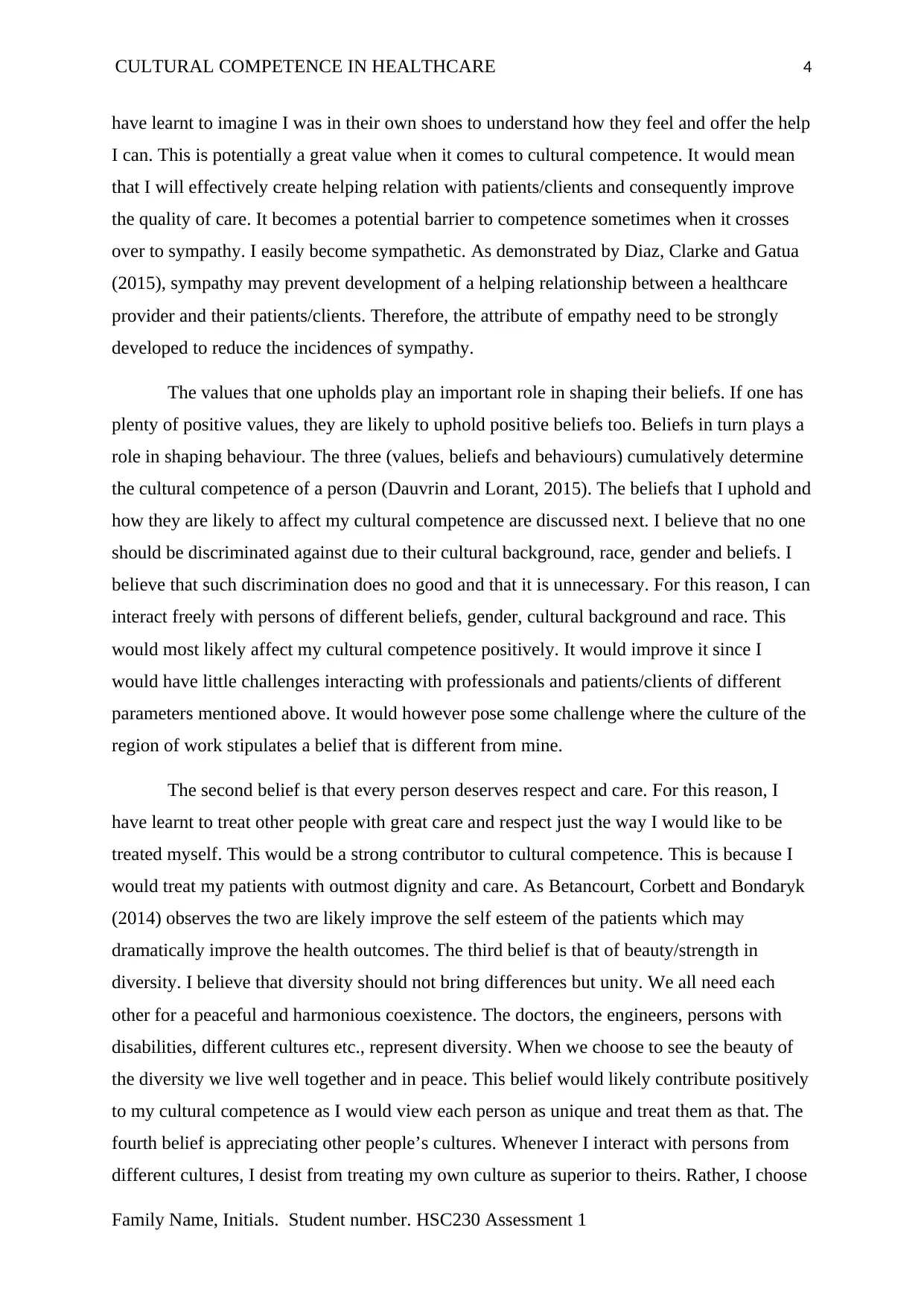
CULTURAL COMPETENCE IN HEALTHCARE 4
have learnt to imagine I was in their own shoes to understand how they feel and offer the help
I can. This is potentially a great value when it comes to cultural competence. It would mean
that I will effectively create helping relation with patients/clients and consequently improve
the quality of care. It becomes a potential barrier to competence sometimes when it crosses
over to sympathy. I easily become sympathetic. As demonstrated by Diaz, Clarke and Gatua
(2015), sympathy may prevent development of a helping relationship between a healthcare
provider and their patients/clients. Therefore, the attribute of empathy need to be strongly
developed to reduce the incidences of sympathy.
The values that one upholds play an important role in shaping their beliefs. If one has
plenty of positive values, they are likely to uphold positive beliefs too. Beliefs in turn plays a
role in shaping behaviour. The three (values, beliefs and behaviours) cumulatively determine
the cultural competence of a person (Dauvrin and Lorant, 2015). The beliefs that I uphold and
how they are likely to affect my cultural competence are discussed next. I believe that no one
should be discriminated against due to their cultural background, race, gender and beliefs. I
believe that such discrimination does no good and that it is unnecessary. For this reason, I can
interact freely with persons of different beliefs, gender, cultural background and race. This
would most likely affect my cultural competence positively. It would improve it since I
would have little challenges interacting with professionals and patients/clients of different
parameters mentioned above. It would however pose some challenge where the culture of the
region of work stipulates a belief that is different from mine.
The second belief is that every person deserves respect and care. For this reason, I
have learnt to treat other people with great care and respect just the way I would like to be
treated myself. This would be a strong contributor to cultural competence. This is because I
would treat my patients with outmost dignity and care. As Betancourt, Corbett and Bondaryk
(2014) observes the two are likely improve the self esteem of the patients which may
dramatically improve the health outcomes. The third belief is that of beauty/strength in
diversity. I believe that diversity should not bring differences but unity. We all need each
other for a peaceful and harmonious coexistence. The doctors, the engineers, persons with
disabilities, different cultures etc., represent diversity. When we choose to see the beauty of
the diversity we live well together and in peace. This belief would likely contribute positively
to my cultural competence as I would view each person as unique and treat them as that. The
fourth belief is appreciating other people’s cultures. Whenever I interact with persons from
different cultures, I desist from treating my own culture as superior to theirs. Rather, I choose
Family Name, Initials. Student number. HSC230 Assessment 1
have learnt to imagine I was in their own shoes to understand how they feel and offer the help
I can. This is potentially a great value when it comes to cultural competence. It would mean
that I will effectively create helping relation with patients/clients and consequently improve
the quality of care. It becomes a potential barrier to competence sometimes when it crosses
over to sympathy. I easily become sympathetic. As demonstrated by Diaz, Clarke and Gatua
(2015), sympathy may prevent development of a helping relationship between a healthcare
provider and their patients/clients. Therefore, the attribute of empathy need to be strongly
developed to reduce the incidences of sympathy.
The values that one upholds play an important role in shaping their beliefs. If one has
plenty of positive values, they are likely to uphold positive beliefs too. Beliefs in turn plays a
role in shaping behaviour. The three (values, beliefs and behaviours) cumulatively determine
the cultural competence of a person (Dauvrin and Lorant, 2015). The beliefs that I uphold and
how they are likely to affect my cultural competence are discussed next. I believe that no one
should be discriminated against due to their cultural background, race, gender and beliefs. I
believe that such discrimination does no good and that it is unnecessary. For this reason, I can
interact freely with persons of different beliefs, gender, cultural background and race. This
would most likely affect my cultural competence positively. It would improve it since I
would have little challenges interacting with professionals and patients/clients of different
parameters mentioned above. It would however pose some challenge where the culture of the
region of work stipulates a belief that is different from mine.
The second belief is that every person deserves respect and care. For this reason, I
have learnt to treat other people with great care and respect just the way I would like to be
treated myself. This would be a strong contributor to cultural competence. This is because I
would treat my patients with outmost dignity and care. As Betancourt, Corbett and Bondaryk
(2014) observes the two are likely improve the self esteem of the patients which may
dramatically improve the health outcomes. The third belief is that of beauty/strength in
diversity. I believe that diversity should not bring differences but unity. We all need each
other for a peaceful and harmonious coexistence. The doctors, the engineers, persons with
disabilities, different cultures etc., represent diversity. When we choose to see the beauty of
the diversity we live well together and in peace. This belief would likely contribute positively
to my cultural competence as I would view each person as unique and treat them as that. The
fourth belief is appreciating other people’s cultures. Whenever I interact with persons from
different cultures, I desist from treating my own culture as superior to theirs. Rather, I choose
Family Name, Initials. Student number. HSC230 Assessment 1
Paraphrase This Document
Need a fresh take? Get an instant paraphrase of this document with our AI Paraphraser
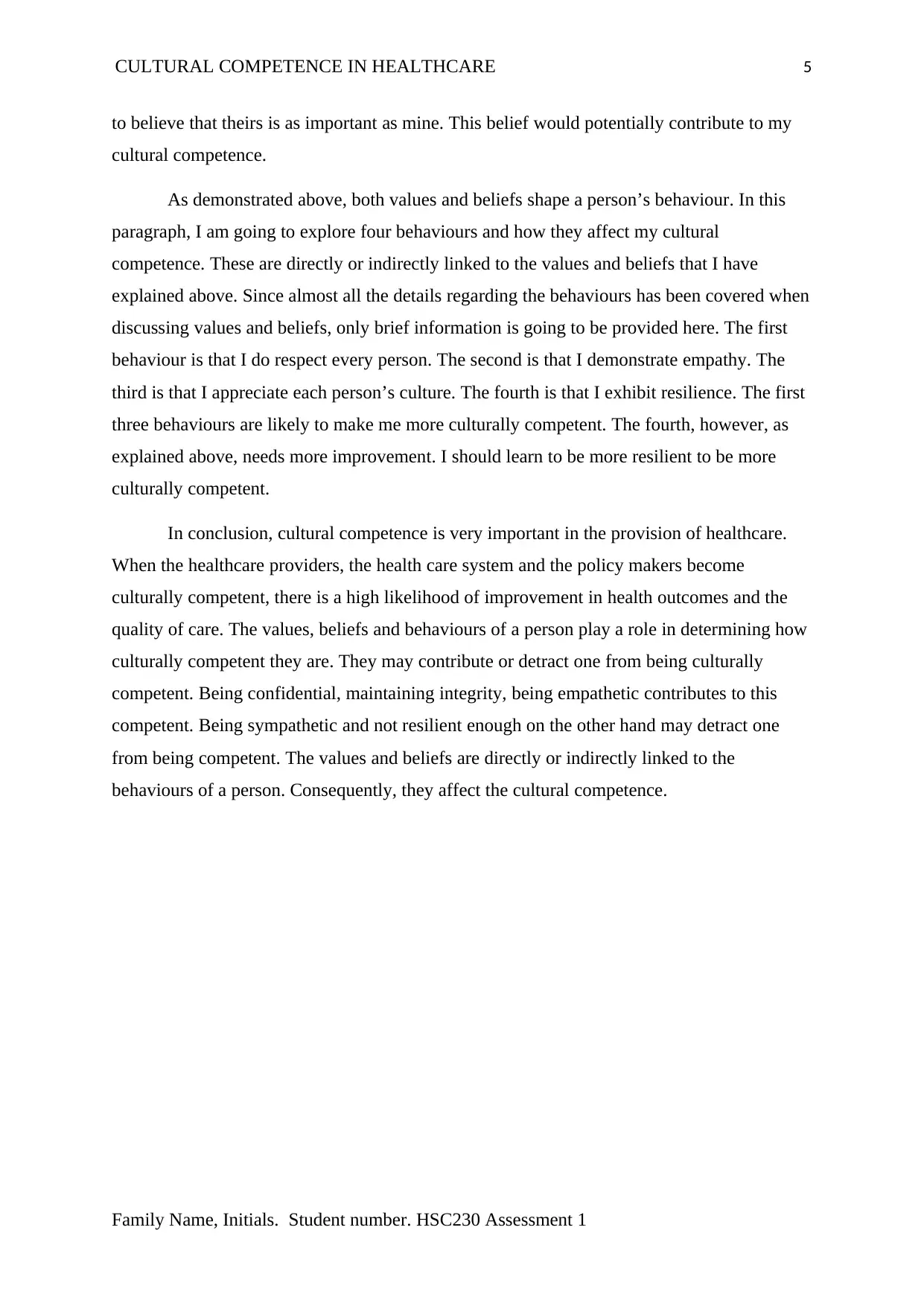
CULTURAL COMPETENCE IN HEALTHCARE 5
to believe that theirs is as important as mine. This belief would potentially contribute to my
cultural competence.
As demonstrated above, both values and beliefs shape a person’s behaviour. In this
paragraph, I am going to explore four behaviours and how they affect my cultural
competence. These are directly or indirectly linked to the values and beliefs that I have
explained above. Since almost all the details regarding the behaviours has been covered when
discussing values and beliefs, only brief information is going to be provided here. The first
behaviour is that I do respect every person. The second is that I demonstrate empathy. The
third is that I appreciate each person’s culture. The fourth is that I exhibit resilience. The first
three behaviours are likely to make me more culturally competent. The fourth, however, as
explained above, needs more improvement. I should learn to be more resilient to be more
culturally competent.
In conclusion, cultural competence is very important in the provision of healthcare.
When the healthcare providers, the health care system and the policy makers become
culturally competent, there is a high likelihood of improvement in health outcomes and the
quality of care. The values, beliefs and behaviours of a person play a role in determining how
culturally competent they are. They may contribute or detract one from being culturally
competent. Being confidential, maintaining integrity, being empathetic contributes to this
competent. Being sympathetic and not resilient enough on the other hand may detract one
from being competent. The values and beliefs are directly or indirectly linked to the
behaviours of a person. Consequently, they affect the cultural competence.
Family Name, Initials. Student number. HSC230 Assessment 1
to believe that theirs is as important as mine. This belief would potentially contribute to my
cultural competence.
As demonstrated above, both values and beliefs shape a person’s behaviour. In this
paragraph, I am going to explore four behaviours and how they affect my cultural
competence. These are directly or indirectly linked to the values and beliefs that I have
explained above. Since almost all the details regarding the behaviours has been covered when
discussing values and beliefs, only brief information is going to be provided here. The first
behaviour is that I do respect every person. The second is that I demonstrate empathy. The
third is that I appreciate each person’s culture. The fourth is that I exhibit resilience. The first
three behaviours are likely to make me more culturally competent. The fourth, however, as
explained above, needs more improvement. I should learn to be more resilient to be more
culturally competent.
In conclusion, cultural competence is very important in the provision of healthcare.
When the healthcare providers, the health care system and the policy makers become
culturally competent, there is a high likelihood of improvement in health outcomes and the
quality of care. The values, beliefs and behaviours of a person play a role in determining how
culturally competent they are. They may contribute or detract one from being culturally
competent. Being confidential, maintaining integrity, being empathetic contributes to this
competent. Being sympathetic and not resilient enough on the other hand may detract one
from being competent. The values and beliefs are directly or indirectly linked to the
behaviours of a person. Consequently, they affect the cultural competence.
Family Name, Initials. Student number. HSC230 Assessment 1
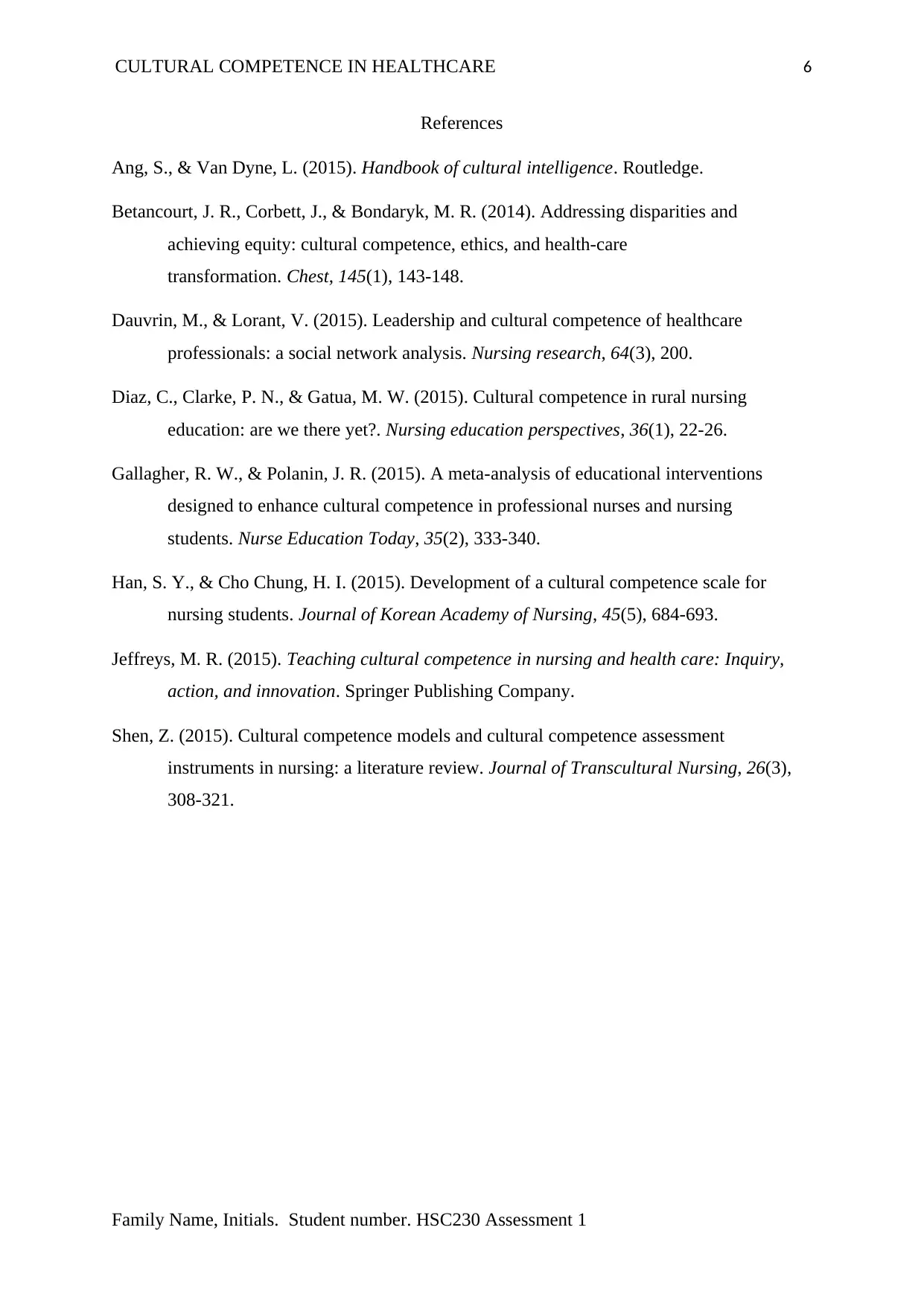
CULTURAL COMPETENCE IN HEALTHCARE 6
References
Ang, S., & Van Dyne, L. (2015). Handbook of cultural intelligence. Routledge.
Betancourt, J. R., Corbett, J., & Bondaryk, M. R. (2014). Addressing disparities and
achieving equity: cultural competence, ethics, and health-care
transformation. Chest, 145(1), 143-148.
Dauvrin, M., & Lorant, V. (2015). Leadership and cultural competence of healthcare
professionals: a social network analysis. Nursing research, 64(3), 200.
Diaz, C., Clarke, P. N., & Gatua, M. W. (2015). Cultural competence in rural nursing
education: are we there yet?. Nursing education perspectives, 36(1), 22-26.
Gallagher, R. W., & Polanin, J. R. (2015). A meta-analysis of educational interventions
designed to enhance cultural competence in professional nurses and nursing
students. Nurse Education Today, 35(2), 333-340.
Han, S. Y., & Cho Chung, H. I. (2015). Development of a cultural competence scale for
nursing students. Journal of Korean Academy of Nursing, 45(5), 684-693.
Jeffreys, M. R. (2015). Teaching cultural competence in nursing and health care: Inquiry,
action, and innovation. Springer Publishing Company.
Shen, Z. (2015). Cultural competence models and cultural competence assessment
instruments in nursing: a literature review. Journal of Transcultural Nursing, 26(3),
308-321.
Family Name, Initials. Student number. HSC230 Assessment 1
References
Ang, S., & Van Dyne, L. (2015). Handbook of cultural intelligence. Routledge.
Betancourt, J. R., Corbett, J., & Bondaryk, M. R. (2014). Addressing disparities and
achieving equity: cultural competence, ethics, and health-care
transformation. Chest, 145(1), 143-148.
Dauvrin, M., & Lorant, V. (2015). Leadership and cultural competence of healthcare
professionals: a social network analysis. Nursing research, 64(3), 200.
Diaz, C., Clarke, P. N., & Gatua, M. W. (2015). Cultural competence in rural nursing
education: are we there yet?. Nursing education perspectives, 36(1), 22-26.
Gallagher, R. W., & Polanin, J. R. (2015). A meta-analysis of educational interventions
designed to enhance cultural competence in professional nurses and nursing
students. Nurse Education Today, 35(2), 333-340.
Han, S. Y., & Cho Chung, H. I. (2015). Development of a cultural competence scale for
nursing students. Journal of Korean Academy of Nursing, 45(5), 684-693.
Jeffreys, M. R. (2015). Teaching cultural competence in nursing and health care: Inquiry,
action, and innovation. Springer Publishing Company.
Shen, Z. (2015). Cultural competence models and cultural competence assessment
instruments in nursing: a literature review. Journal of Transcultural Nursing, 26(3),
308-321.
Family Name, Initials. Student number. HSC230 Assessment 1
⊘ This is a preview!⊘
Do you want full access?
Subscribe today to unlock all pages.

Trusted by 1+ million students worldwide
1 out of 6
Related Documents
Your All-in-One AI-Powered Toolkit for Academic Success.
+13062052269
info@desklib.com
Available 24*7 on WhatsApp / Email
![[object Object]](/_next/static/media/star-bottom.7253800d.svg)
Unlock your academic potential
Copyright © 2020–2026 A2Z Services. All Rights Reserved. Developed and managed by ZUCOL.





